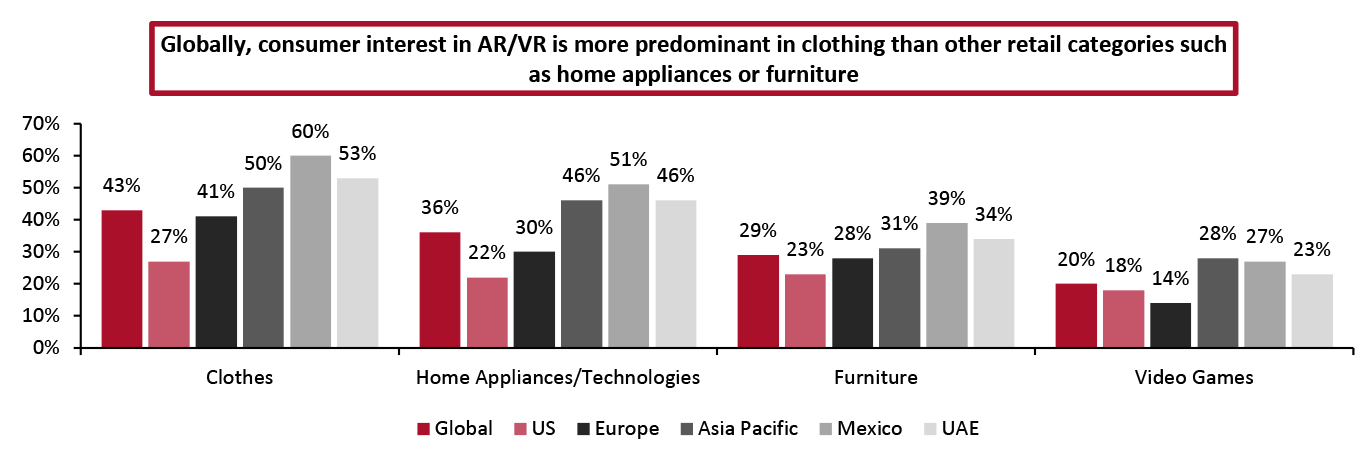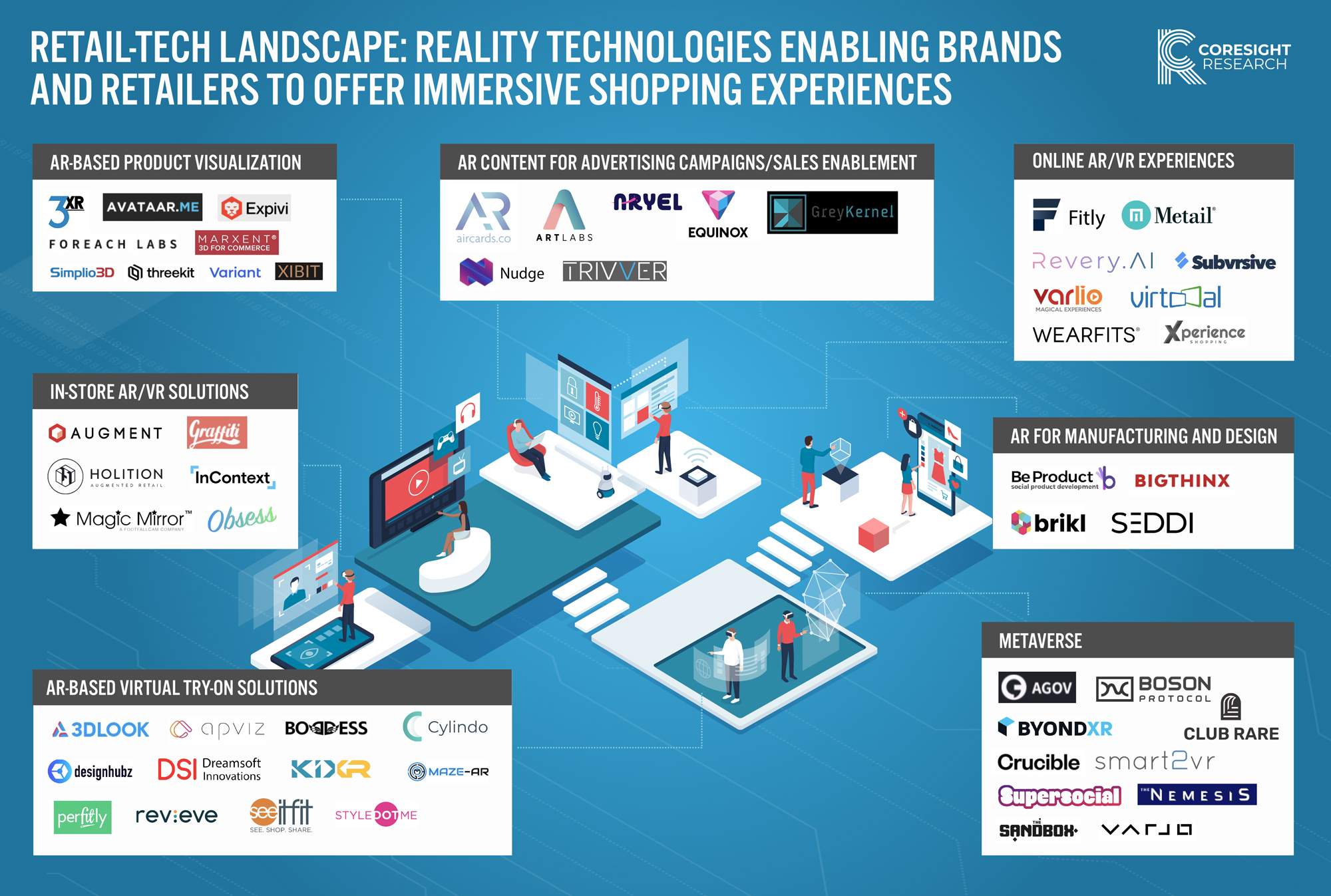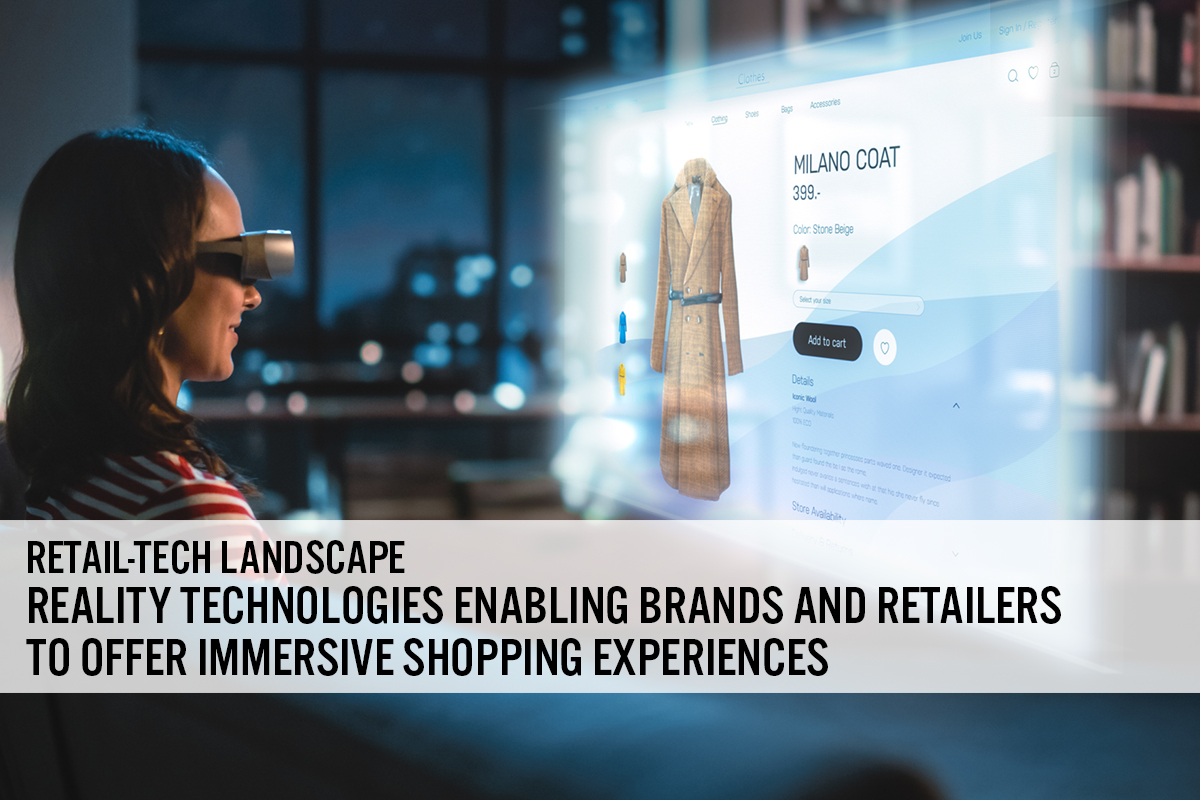Retail-Tech Landscape: Reality Technologies
Reality technologies are an umbrella term for immersive technologies including AR, VR, mixed reality (MR), 360-degree video, 3D (three-dimensional) visualization, 3D product configuration and conversational AI (artificial intelligence). The technologies can be used to create an artificial, virtual environment through computer-generated content. Brands and retailers leverage these technologies to offer immersive shopping experiences to their consumers and optimize the advertising, manufacturing and design processes.
We expect to see continued uptake of reality technologies among retail players: 64% of the leading consumer brands plan to invest in immersive technologies for commerce, according to global consulting firm Accenture’s March 2020 survey of consumers across 12 countries in North America, Europe and Asia-Pacific. Furthermore, 47% of surveyed consumers stated that immersive technologies make them feel connected with products and are that they are also willing to pay extra to customize or personalize the product using immersive technologies.
This
Retail-Tech Landscape covers selected startups globally that offer reality technology solutions, focused on AR and VR. We have identified 56 startups and companies across the following categories:
- AR-based product visualization
- AR-based virtual try-on solutions
- Metaverse
- In-store AR/VR solutions
- Online AR/VR experiences
- AR content for advertising campaigns/sales enablement
- AR for manufacturing and design
Reality Technology Trends in Retail
Below, we highlight two key industry trends in reality technologies.
1. Reality Technologies Are Bridging Retail’s Physical and Digital Gap
With consumers’ inclination toward online shopping channels, brands and retailers are increasingly looking to integrate reality technologies into their businesses to bridge the physical and digital gap. These technologies enable retail players to replicate physical shopping experiences and interactions in an online environment or enhance their brick-and-mortar spaces with strong digital connections and services.
While online retailers use virtual shopping technologies to address consumers’ craving for a “human” connection during shopping, physical retail stores are looking to reality technologies to offer tech-powered, seamless shopping experience and stay competitive with their online competitors.
Globally, 43% of consumers show considerable interest in adopting AR/VR in shopping for clothing, surpassing interest in home appliances, furniture and gaming, as shown in Figure 1.
Figure 1. Global Consumer Interest in AR/VR Across Retail Categories, by Region (% of Respondents)
[caption id="attachment_140670" align="aligncenter" width="700"]
 Base: 19,188 consumers across the US, the UK, Asia-Pacific, Mexico and the UAE surveyed in January and February 2021
Base: 19,188 consumers across the US, the UK, Asia-Pacific, Mexico and the UAE surveyed in January and February 2021
Categories as published in the survey
Source: YouGov [/caption]
2. Retailers Should Gear-Up To Become “Metaverse-Ready”
With the metaverse concept skyrocketing in popularity after Facebook changed its name to Meta in October 2021, retail brands and e-commerce companies have started thinking of creative ways to get involved in it the network of virtual worlds it comprises.
- Alibaba’s Tmall launched its “Double 11 Metaverse Art Exhibition” on its mobile app in October 2021. The e-commerce platform hosted eight luxury brands, including Burberry, Coach and Longines, all of which created collections of non-fungible tokens (NFTs)—unique, non-interchangeable digital assets that ascribe ownership of a digital or physical item—for Singles’ Day 2021.
- British luxury brand Burberry unveiled a limited-edition scarf paired with an animated deer NFT for $455, during the exhibition, which sold out immediately.
Although the metaverse is in its nascent stages, its development will be the next big thing in technology, with brands and retailers sure to follow. Retailers should focus on having digital versions of their physical products with the goal of launching them in the metaverse and leverage the space to host virtual events and virtual shops—combining media such as NFTs with digital worlds built on AR and VR.
- We have identified over 30 Western retail and consumer-goods brands launching NFT products in the final quarter of 2021, as of mid-December 2021. Read more about the metaverse as a key global trend for 2022.
Retail-Tech Landscape: Reality Technologies—Infographic

Retail-Tech Landscape: Reality Technologies, by Category
AR-Based Product Visualization: Companies enabling brands and retailers to display their products virtually using AR technology
[wpdatatable id=1675 table_view=regular]
AR-Based Virtual Try-On Solutions: Companies enabling brands and retailers to provide virtual try-on solutions for their customers leveraging AR technologies
[wpdatatable id=1676 table_view=regular]
Metaverse: Companies offering solutions that help retailers create digitalized experiences for the Metaverse and use NFTs for commerce
[wpdatatable id=1677 table_view=regular]
In-Store AR/VR Solutions: Companies helping brands and retailers with in-store AR/VR solutions for immersive shopping experiences such as virtual try-on and 3D visualization
[wpdatatable id=1678 table_view=regular]
Online AR/VR Experiences: Companies offering AR/VR solutions for size fitting, 3D modeling and product visualization for online retailers and e-commerce companies
[wpdatatable id=1679 table_view=regular]
AR Content for Advertising Campaigns/Sales Enablement: Companies helping brands and retailers to create AR-powered advertising and marketing campaigns and track effectiveness
[wpdatatable id=1680 table_view=regular]
AR for Manufacturing and Design: Companies that help brands and retailers to leverage reality technology solutions for the design, development and manufacturing of products
[wpdatatable id=1681 table_view=regular]

 Base: 19,188 consumers across the US, the UK, Asia-Pacific, Mexico and the UAE surveyed in January and February 2021
Base: 19,188 consumers across the US, the UK, Asia-Pacific, Mexico and the UAE surveyed in January and February 2021 